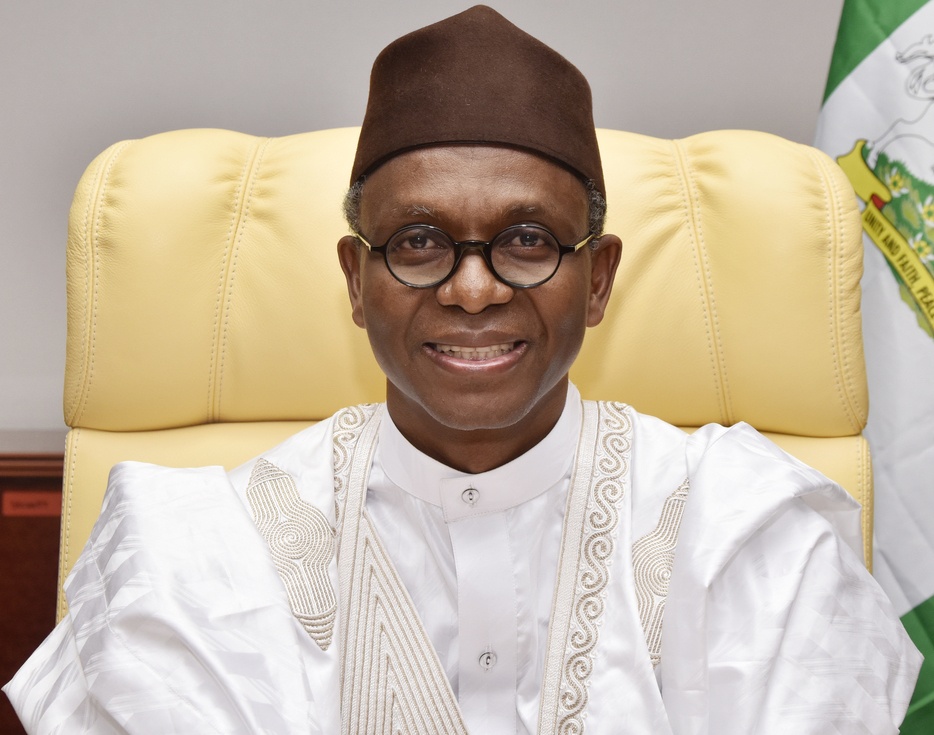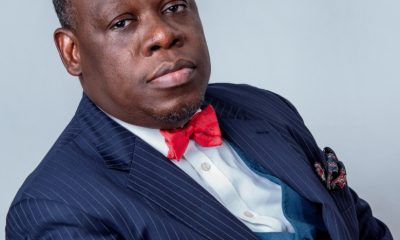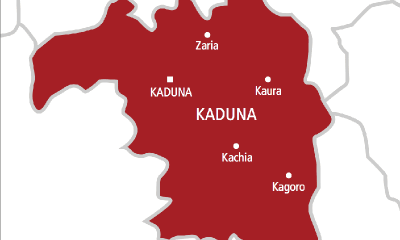Jobs/Appointments
Kaduna is Sacking Workers to Save Scarce Funds—El-Rufai

By Adedapo Adesanya
The Governor of Kaduna State, Mr Nasir El-Rufai, has explained the reason his administration is trimming the workforce of the state’s public service is due to the dwindling financial resources and higher wage bills which the government cannot be able to sustain, noting that the exercise will help the government to save scarce funds.
The Kaduna state government had on April 6 disengaged 4,000 local government workers and this development has raised dust, especially from the state chapter of the Nigeria Labour Congress (NLC).
The body kicked against the decision, calling on the state government to reverse the decision and seek alternative means of running its affairs without inflicting additional pains on the public.
In a statement signed by his spokesman, Mr Muyiwa Adekeye, Governor El-Rufai insisted that the government was not elected just to pay salaries of public servants alone, but to also develop the state by building schools, hospitals, upgrading infrastructure and making the state more secure and attractive to the private sector for jobs and investments.
Mr El-Rufai pointed out that what it has been receiving from the federal allocation committee since the middle of 2020, like most other sub-nationals, can barely pay salaries and overheads, adding that in the last six months, personnel costs have accounted for between 84.97 per cent and 96.63 per cent of Federation Account Allocation Communication (FAAC) transfers received by the Kaduna State Government.
“In November 2020, KDSG had only N162.9 million left after paying salaries. That month, Kaduna State got N4.83 billion from FAAC and paid N4.66 billion as wages. In March 2021, Kaduna State had only N321 million left after settling personnel costs,” a part of the statement read.
The statement pointed out that “last month, the state got N4.819 billion from FAAC and paid out N4.498 billion, representing 93 per cent of the money received.
‘’This does not include standing orders for overheads, funding security operations, running costs of schools and hospitals, and other overhead costs that the state has to bear for the machinery of government to run, for which the state government taps into IGR earnings.”
The Kaduna State Government said it believes that the overall wages of the public sector are still relatively low, noting that the current levels were obviously limited by the resources available to the government.
The government further argued that the public service of the state with less than 100,000 employees (and their families) cannot be consuming more than 90 per cent of government resources, with little left to positively impact the lives of the more than 9 million that are not political appointees or civil servants, adding that it is gross injustice for such a micro-minority to consume the majority of the resources of the state.
In addition, it pointed out that the measures which the government took to cope with the COVID-19 pandemic have shown clearly that the public service requires much fewer persons than it currently employs.
The statement recalled that “in September 2019, Kaduna State Government became the first government in the country to pay the new minimum wage and consequential adjustments. The state government followed this up by increasing the minimum pension of persons on the defined benefits scheme to N30,000 monthly.
“This step to advance the welfare of workers significantly increased the wage burden of the state government and immediately sapped up the funds of many local governments.”
According to the state government, “what each public servant earns might be puny in comparison to private-sector wages, but the total wage bill consumes much of the revenues of the state.
‘’Therefore, the state government has no choice but to shed some weight and reduce the size of the public service. It is a painful but necessary step to take, for the sake of the majority of the people of this state.”
While justifying the job cut, the statement, however, described it “as a painful but necessary step to take, for the sake of the majority of the people of this state.”
The Governor further said that the rationalisation exercise will also affect political appointees, stating that its purpose is to save funds and ensure that a strong and efficient public service exists to use those resources to implement progressive programmes and projects for the people, and thereby develop the state.
‘’The public service is an important institution, and it should therefore maintain only an optimum size.
“Faced with a difficult situation, the Kaduna State Government is persuaded that it cannot refuse to act or act in ways that only conduce to populist sentiment, without solving the fundamental problem,” he said.
Jobs/Appointments
Court Sanctions CHI Limited for Wrongful Employment Termination

By Modupe Gbadeyanka
The termination of the employment of one Mr Bodunrin Akinsuroju by CHI Limited has been declared as unlawful by the National Industrial Court of Nigeria.
Delivering judgment on the matter, Justice Sanda Yelwa of the Lagos Judicial Division of the court held that the sacking of Mr Akinsuroju did not comply strictly with the provisions of the contract of employment and the Employee Handbook.
Consequently, the company was directed to pay him the sum of N2 million as general damages for wrongful termination and N200,000 as costs of action, while Mr Akinsuroju was ordered to return the company’s properties in his possession or pay their assessed market value.
Justice Yelwa found that the contract agreement between both parties clearly required either party to give 30 days’ notice or payment in lieu of notice after confirmation of appointment, and there was no evidence that the employee was given the required notice or paid salary in lieu of notice.
The judge held that failure to comply with this fundamental term amounted to a breach of the contract of employment, thereby rendering the termination wrongful.
Mr Akinsuroju had claimed that the allegation of misconduct against him was unfounded and not established, maintaining that the disciplinary committee proceedings were prejudicial and that the termination of his employment was without justifiable cause and without compliance with the agreed terms of his employment.
In defence, CHI Limited contended that it had the right to terminate the employment of Mr Akinsuroju and that the termination was lawful and in accordance with the contract of employment and the Code of Conduct.
In opposition, counsel to Mr Akinsuroju submitted that the alleged breaches were not proved and that the termination letter took immediate effect without the requisite 30 days’ notice or payment in lieu of notice as stipulated in the letter of appointment and the Employee Handbook, urging the court to hold that the termination was wrongful and to grant the reliefs sought.
Jobs/Appointments
Tinubu Appoints Tunji Disu as Acting Inspector General of Police

By Modupe Gbadeyanka
President Bola Tinubu on Tuesday appointed Mr Tunji Disu as the acting Inspector General of Police (IGP), following the resignation of Mr Kayode Egbetokun.
Mr Disu, an Assistant Inspector General of Police (AIG), was recently moved to the Force Criminal Investigation Department (FCID) Annex, Alagbon, Lagos.
A statement today by the Special Adviser to the President on Information and Strategy, Mr Bayo Onanuga, disclosed that the President would convene a meeting of the Nigeria Police Council shortly to formally consider the appointment of Mr Disu as substantive IGP, after which his name will be transmitted to the Senate for confirmation.
Mr Tinubu expressed confidence that Mr Disu’s experience, operational depth, and demonstrated leadership capacity would provide steady and focused direction for the Nigeria Police Force during this critical period.
He reiterated his administration’s unwavering commitment to enhancing national security, strengthening institutional capacity, and ensuring that the Nigeria Police Force remains professional, accountable, and fully equipped to discharge its constitutional responsibilities.
Mr Egbetokun was said to have resigned from the position due to pressing family considerations.
President Tinubu, who accepted the resignation letter, expressed his profound appreciation for Mr Egbetokun’s decades of distinguished service to the Nigeria Police Force and the nation. He acknowledged his dedication, professionalism, and steadfast commitment to strengthening internal security architecture during his tenure.
Appointed in June 2023, Mr Egbetokun was serving a four-year term scheduled to conclude in June 2027, in line with the amended provisions of the Police Act.
The statement disclosed that his replacement was in view of the current security challenges confronting the nation, and acting in accordance with extant laws and legal guidance.
Jobs/Appointments
Tunji Disu to Become New IGP as Egbetokun Quits

By Adedapo Adesanya
Mr Tunji Disu, an Assistant Inspector General of Police (AIG), has reportedly replaced Mr Kayode Egbetokun as the new Inspector General of Police (IGP).
Mr Egbetokun resigned from the position on Tuesday after he was said to have held a meeting with President Bola Tinubu on Monday night at the Presidential Villa in Abuja.
President Tinubu appointed Mr Egebtokun as the 22nd IGP on June 19, 2023, with his appointment confirmed by the Nigeria Police Council on October 31, 2023.
Appointed as IGP at the age of 58, Mr Egbetokun was due for retirement on September 4, 2024, upon reaching the mandatory age of 60, but his tenure was extended by the President, creating controversies, which trailed him until his exit from the force today.
Although the police authorities are yet to comment on the matter or issue an official statement about his resignation, the move came amid reports suggesting that Mr Egbetokun has left the position.
Mr Egbetokun’s tenure was marred by a series of controversies; he recently initiated multiple charges against activist Mr Omoyele Sowore and his publication, SaharaReporters, after Mr Sowore publicly described him as an “illegal IGP.”
The dispute escalated into protracted legal battles, with the Federal High Court issuing injunctions restricting further publications relating to the former police chief and members of his family. Critics interpreted these court actions as attempts to stifle dissent and weaken press freedom.
His replacement, Mr Disu, was posted to oversee the Force Criminal Investigation Department (FCID) Annex, Alagbon, Lagos, some days ago.
-

 Feature/OPED6 years ago
Feature/OPED6 years agoDavos was Different this year
-
Travel/Tourism10 years ago
Lagos Seals Western Lodge Hotel In Ikorodu
-

 Showbiz3 years ago
Showbiz3 years agoEstranged Lover Releases Videos of Empress Njamah Bathing
-

 Banking8 years ago
Banking8 years agoSort Codes of GTBank Branches in Nigeria
-

 Economy3 years ago
Economy3 years agoSubsidy Removal: CNG at N130 Per Litre Cheaper Than Petrol—IPMAN
-

 Banking3 years ago
Banking3 years agoSort Codes of UBA Branches in Nigeria
-

 Banking3 years ago
Banking3 years agoFirst Bank Announces Planned Downtime
-

 Sports3 years ago
Sports3 years agoHighest Paid Nigerian Footballer – How Much Do Nigerian Footballers Earn
















